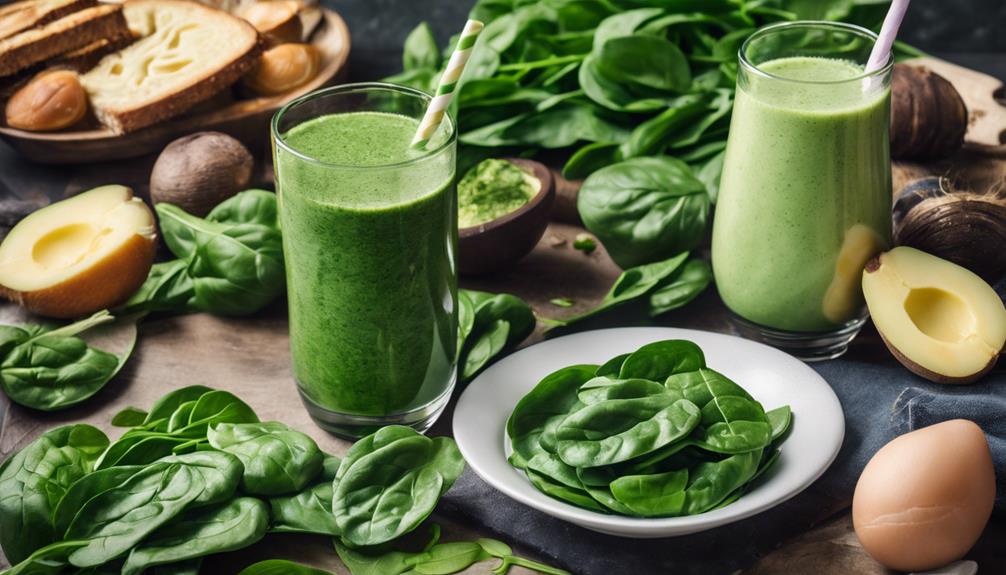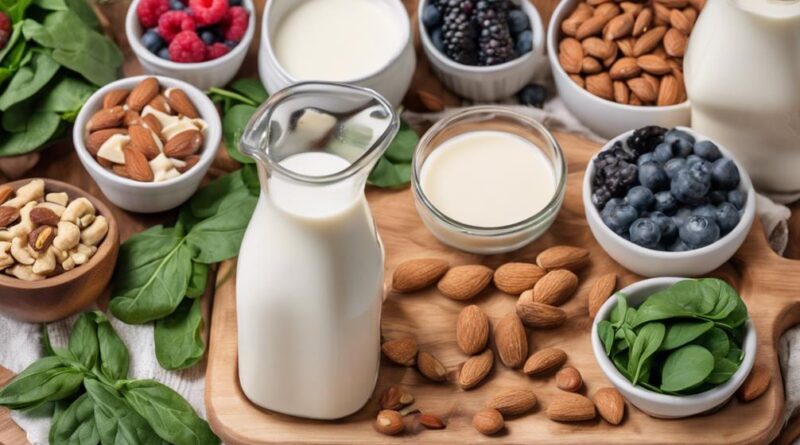Top Lactose-Free Foods for the Health Conscious
Looking for top lactose-free foods to boost your health? Almond milk is a low-calorie option rich in vitamins. Try coconut yogurt for gut health. Quinoa is a versatile complete protein while chia seeds are omega-3 powerhouses. Tempeh offers plant-based protein and essential nutrients. Enjoy fiber-rich oatmeal and iron-packed spinach for a nutritious meal. Blueberries are full of antioxidants for heart health. Embracing lactose-free options can be a game-changer for your well-being. Ready to discover more lactose-free foods for a healthier lifestyle?
Almond Milk: A Dairy Alternative
If you're seeking a dairy alternative that's both nutritious and versatile, consider incorporating almond milk into your diet. Almond milk offers a range of benefits, making it an excellent substitute for those who are lactose intolerant or looking to explore different options.
One of the primary advantages of almond milk is that it's naturally lactose-free, making it a suitable choice for individuals with lactose intolerance. Additionally, almond milk is low in calories and can be fortified with vitamins and minerals, such as calcium and vitamin D, to enhance its nutritional value.
In terms of recipes, almond milk can be used in various ways to add a creamy texture and nutty flavor to dishes. You can use almond milk as a base for smoothies, oatmeal, or even in baked goods like muffins and pancakes. For those looking to enjoy a warm beverage, almond milk can be steamed and used as a dairy-free alternative in coffee or tea.
For individuals who may be allergic to almonds or prefer different flavors, there are alternative options such as soy milk, coconut milk, or oat milk available in the market. These alternatives can provide similar benefits to almond milk while catering to different taste preferences.
Quinoa: Versatile and Nutritious
Quinoa, a versatile and nutritious grain, is a powerhouse of essential nutrients and offers a wide range of culinary possibilities for health-conscious individuals. This ancient grain is a complete protein source, containing all nine essential amino acids necessary for bodily functions. It's also packed with fiber, vitamins, and minerals, making it a great addition to a balanced diet.
One of the key benefits of quinoa is its versatility in the kitchen. You can enjoy quinoa in a variety of ways, from salads and soups to main dishes and even breakfast bowls. Quinoa can be used as a substitute for rice or pasta, adding a nutty flavor and a nutritional boost to your meals. Incorporating quinoa into your diet can help increase your protein intake, promote satiety, and support overall health.
When looking for quinoa recipes, consider trying a quinoa salad with fresh vegetables and a lemon vinaigrette, or a quinoa stir-fry with tofu and mixed greens. These dishes not only taste delicious but also provide a good dose of nutrients to fuel your body. With its numerous health benefits and culinary possibilities, quinoa is indeed a valuable addition to any health-conscious individual's diet.
Chia Seeds: Packed With Omega-3s
Chia seeds, rich in omega-3 fatty acids, are a nutritional powerhouse that can complement your health-conscious diet. These tiny seeds are packed with numerous benefits that make them a valuable addition to your meals. One of the key advantages of chia seeds is their high omega-3 content, which is essential for brain health, reducing inflammation, and supporting heart health.
In addition to being an excellent plant-based source of omega-3s, chia seeds are also rich in fiber, antioxidants, and various essential nutrients. The combination of omega-3 fatty acids and fiber in chia seeds can help improve digestion, promote satiety, and support weight management.
Furthermore, chia seeds are versatile and easy to incorporate into your daily diet. You can sprinkle them on top of yogurt, oatmeal, or salads, mix them into smoothies, or use them as an egg substitute in baking. Their mild, nutty flavor makes them a great addition to both sweet and savory dishes.
Including chia seeds in your meals is a simple way to boost your intake of omega-3 fatty acids and reap the associated health benefits. Whether you're looking to support your heart health, improve brain function, or enhance your overall well-being, chia seeds are a convenient and nutritious option to consider.
Tempeh: Plant-Based Protein Source
Tempeh, as a plant-based protein source, offers a nutritious and versatile addition to your health-conscious diet. This fermented soy product provides a unique flavor profile with its rich and nutty taste, making it a popular choice for those seeking alternative protein options. Tempeh isn't only a great source of plant-based protein but also contains a variety of essential nutrients such as iron, calcium, and probiotics due to the fermentation process.
Incorporating tempeh into your meals can be a delightful experience, especially when exploring its fermented flavors. You can enjoy tempeh by marinating it in soy sauce, lemon juice, or your favorite herbs and spices to enhance its taste. Cooking techniques like grilling, baking, or sautéing can bring out different textures and flavors in tempeh, making it a versatile ingredient in various dishes.
Tempeh's firm texture makes it a suitable meat substitute in dishes like stir-fries, sandwiches, salads, and wraps. It can also be crumbled and used as a topping for pizzas or mixed into pasta sauces for an added protein boost. With its ability to absorb flavors well, tempeh can adapt to a wide range of culinary styles, making it a valuable addition to any health-conscious kitchen.
Coconut Yogurt: Creamy and Delicious
Creamy and delicious, coconut yogurt is a flavorful dairy-free alternative that can elevate your health-conscious diet with its rich texture and probiotic benefits. This dairy-free dessert is made from coconut milk and packed with probiotics, which are beneficial bacteria that support gut health. Probiotics help maintain a healthy balance of microorganisms in the gut, aiding digestion and supporting the immune system.
Coconut yogurt isn't only a delicious treat but also a great way to incorporate probiotics into your diet without consuming dairy. These probiotic benefits can contribute to overall well-being and may help alleviate symptoms of digestive issues such as bloating, gas, and constipation.
When choosing coconut yogurt, look for options that contain live and active cultures to ensure you're getting the probiotic benefits. You can enjoy coconut yogurt on its own, or use it as a topping for smoothie bowls, parfaits, or as a base for dairy-free desserts.
Incorporating coconut yogurt into your diet is a tasty way to support your health while enjoying a creamy and satisfying treat. Try different flavors and brands to find your favorite, and reap the probiotic benefits of this dairy-free delight.
Oatmeal: Fiber-Rich Breakfast Option
Looking for a fiber-rich breakfast option to kickstart your day in a healthy way? Oatmeal is a fantastic choice that not only provides a hearty start but also comes with numerous benefits and opportunities for creative combinations with various toppings.
Oatmeal is a nutritional powerhouse, packed with fiber that keeps you full and helps maintain stable blood sugar levels throughout the morning. It contains beta-glucans, a type of soluble fiber known for its heart-healthy properties and ability to reduce cholesterol levels. Additionally, oatmeal is a good source of complex carbohydrates, offering sustained energy to fuel your day.
When it comes to oatmeal, the possibilities for toppings are endless. You can mix in fresh fruits like berries or bananas for natural sweetness and added nutrients. Nuts and seeds such as almonds, chia seeds, or flaxseeds provide healthy fats and a satisfying crunch. For a touch of sweetness, try adding a drizzle of honey or maple syrup. Experiment with savory options like avocado, eggs, or a sprinkle of cheese for a unique twist.
Incorporating oatmeal into your breakfast routine can contribute to better overall health and well-being. Its fiber content, along with the array of creative toppings you can use, makes it a delicious and nutritious choice to start your day right.
Spinach: Iron-Packed Leafy Green

Spinach, a nutrient-rich leafy green, is renowned for its high iron content, making it a valuable addition to a balanced diet. Iron is an essential mineral that plays a crucial role in the body, aiding in the transportation of oxygen and supporting overall energy levels. Incorporating spinach into your meals can help boost your iron intake naturally.
One key point to consider is iron absorption. While spinach is rich in iron, the type of iron it contains is non-heme iron, which isn't as easily absorbed by the body as heme iron found in animal products. To enhance iron absorption, pair spinach with vitamin C-rich foods like citrus fruits, bell peppers, or tomatoes. This combination can significantly improve the uptake of iron from plant-based sources like spinach.
For those following a vegetarian or vegan diet, spinach can be a particularly beneficial food. It provides a significant amount of iron without the need for animal products. Including spinach in vegetarian recipes such as salads, smoothies, stir-fries, or soups can help meet your iron needs in a delicious and nutritious way.
Blueberries: Antioxidant-Rich Superfood
Blueberries, known as an antioxidant-rich superfood, offer a multitude of health benefits due to their powerful nutritional profile. These little berries pack a big punch when it comes to promoting overall well-being. Here's why you should consider incorporating more blueberries into your diet:
- Antioxidant Powerhouse: Blueberries are loaded with antioxidants, particularly flavonoids like anthocyanins, which help combat oxidative stress in the body and reduce the risk of chronic diseases.
- Heart Health: The high levels of antioxidants in blueberries have been linked to improved heart health by reducing blood pressure, preventing heart attacks, and enhancing overall cardiovascular function.
- Brain Boost: Some studies suggest that the compounds in blueberries may improve cognitive function and protect the brain from age-related decline, potentially lowering the risk of conditions like Alzheimer's disease.
- Versatile and Delicious: Blueberries can be enjoyed in various ways, from adding them to your morning oatmeal or yogurt to blending them into refreshing blueberry smoothies. They also make for scrumptious additions to baked goods like blueberry muffins, offering a sweet and tangy flavor profile that elevates these treats to a new level of deliciousness.
Incorporating blueberries into your diet is a simple and tasty way to reap the numerous health benefits they offer. Whether you enjoy them fresh, frozen, or in your favorite recipes, these tiny fruits can make a big difference in your overall health and well-being.
Conclusion
Incorporating lactose-free foods into your diet can be a delicious and nutritious way to support your overall health.
With options like almond milk, quinoa, chia seeds, and more, you can enjoy a variety of tasty and satisfying choices that are free of lactose.
These foods aren't only suitable for those with lactose intolerance but also offer numerous health benefits, making them a great addition to any health-conscious individual's diet.
